Another Timbre TimHarrisonbre
at90 Klaus Filip & Leonel Kaplan - ‘tocando fondo’
2 improvisations recorded in Buenos Aires in January 2014
Klaus Filip - sinewaves
Leonel Kaplan - trumpet
I - 27:42
II - 22:48
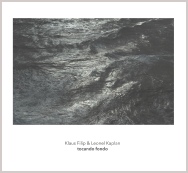
Interview with Leonel Kaplan & Klaus Filip
Seeing as you live in different continents, it’s rather surprising that you have developed a duo project. How did it come about?
Leonel: It is not that surprising (at least to me) as all my musical partners up to now are living overseas. It’s not something I choose, but it has happened from the very beginning.
Klaus: I was visiting Leonel in Buenos Aires, we played together in a small club and we talked a lot. The recording for this CD happened afterwards during a very hot night in Leonel’s house.
Are the pieces entirely improvised, or did you have any sort of plan going into the recordings?
LKeonel They are improvised. We didn’t talk about anything music related before playing, though yes, in post-production we discussed a lot. We played two long pieces, and because of the timing limitations on a CD, and, I think, the inner complexity of the music we played, we had to cut out almost half the music. For me, improvisation is just a tool to make things happen. Like a painter choosing between oil or acrylics. Post-production is where compositional ideas came into play. It was a process of listening and refining until the pieces revealed themselves. Sometimes you take things out because you don’t like them, and sometimes you take them out because they don’t fit with where the piece is going, even if you like the music. So, somehow, you start thinking and talking about form. The original improvisation is like a rough stone, and we started sculpting it.
We worked on this music for a full year. Klaus’s playing is so extremely complex that you can’t work on it for long before starting to hear things that doesn’t exist. It’s like a mirage, and you need lots of rests, and to start again with fresh ears after any change you make to the music.
Why the title ‘tocando fondo’?
Klaus: The title is inspired by the cover artwork by Margarita García Faure and by the poetry of the Spanish language. Our music is floating but also extreme, haptic and concrete.
What is your musical background, and how did you get into improvised music?
Leonel: I came from jazz, then free jazz and the whole avant-garde movement. This was the music I learned, and is mostly the music I still listen to. I probably got into non-idiomatic improvisation thanks to the Argentinian economic crisis. My parents and sisters moved to Spain in 2000 and, though I stayed in Buenos Aires, I started traveling to Europe a lot, where I met musicians like Wade Mathews, Michel Doneda, Lê Quan Ninh and Axel Dörner. It was the right moment. Something was in the air and I jumped in quickly and naturally. I was searching for something, and discovered that there were many other people out there looking for the same thing. I felt comfortable with these ideas. So in a way I was lucky in my misfortune.
Klaus, how did you come to focus exclusively on sinewaves as your instrument?
Klaus: Since playing with the computer, I had to find a way to use it as a musical instrument. First I was playing a lot with samples and edited speech, but I wanted to perform music that is focused on itself - abstract. Also I needed a possibility to play/improvise together with other musicians in a musical way. Around 2000 I came across programming on sinewaves still with the aim of generating speech (additive synthesis). It was during this work that I started to become fascinated and attracted by the sound and mutual reaction of just a few of these simple tones.
Leonel, I imagine that the experimental/improv music scene in Argentina – and Latin America generally – is pretty small, certainly as compared to, say, Berlin or London. Can you tell us about what is going on? Are there things we in Europe should know about but don’t?
Leonel: The experimental scene in Buenos Aires is pretty big, though somehow conservative in a way, which is something I still don’t understand. ‘Conservative’ meaning that they are mostly attached to old ideas. But of course you find major exceptions like Alan Courtis, to name just one. But if you go deeper into free improv, or even deeper into non-idiomatic improvisation, then it’s quite difficult to find a real scene. We were always very minimal in numbers. But then again, this small scene has come up with some great musicians like Lucio Capece, Diego Chamy, Gabriel Paiuk, and Sergio Merce. Most of them have been living in Europe for a long time now, and it’s hard to find a new generation of musicians interested in what we started here fifteen years ago.
Klaus, what was your impression of the Latin American scene as you were travelling through? How does it compare with the current state of affairs in Vienna? Are there advantages to being a small scene?
Klaus: I only met very few musicians in Latin America, so there is no way I can talk about its scene. Those I met were very dedicated and focused on their personal approach, like Sergio Merce, Eden Carrasco, Fil Uno, Luis Toto Alvarez and Rolando Hernandez. In Vienna the scene is very diverse, or I would even say there are different separated scenes that all do improvised music. There are not too many people in Vienna that I play with. I need to travel to find my collaborations.
Funding for experimental music these days is pretty scarce anywhere. I assume that you both have to make your living outside of music. What do you do, and do you think it affects your musical practice in any way?
Leonel: I’m a trumpet teacher, but I teach in my studio not in a school, which I really like. That’s the way I make my living. I love teaching and I love playing the trumpet. Teaching gives me plenty of freedom to play the music I want to play without making any compromise with the establishment for funding, and it also makes me play and think about my instrument every day. I play the trumpet for four hours every day, so when I play my music, I’m in a good shape physically, which is essential for the trumpet. There’s another aspect to this situation: I don’t play live very often nowadays (maybe once a month or once every two months). This is because I live far away from my musical partners, and because I teach a lot, and also because I don’t feel like playing with everybody just for the sake of improvisation. Lately my music has been happening a lot in my unconscious, and I trust that. Every time I play, something new, something very precise and mature comes up. It’s wonderful. This is my unconscious that has been working away while I was playing scales or listening to Albert Ayler’s music.
Klaus: I teach sound art at a university, which is only a tiny job. And I do other jobs like programming for theatre productions, or for the bicycle shop of a friend of mine. Also I used to curate a festival in Austria. So no, I don’t make my living from music, but this also keeps my musical approach independent from commercial pressures. On the other hand all these things I do apart from actually playing music take a lot of time. I would prefer to play live much more frequently - one of the main reasons why I like touring.
Margarita García Faure: "Cámara Antártica: Mar II"
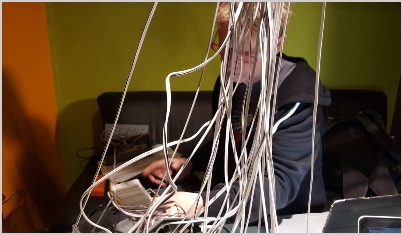
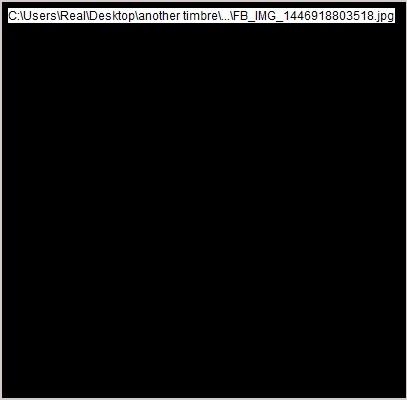
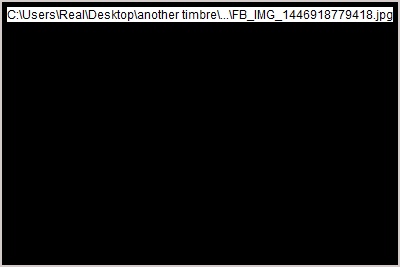
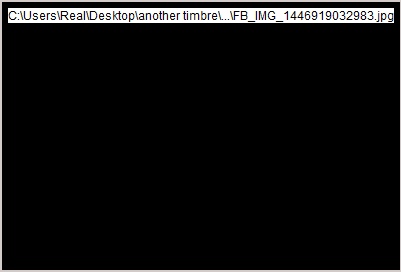

Reviews
“Here is another beautiful international collaboration from Another Timbre. Neither German sine wave artist Klaus Filip nor Argentinian trumpeter Leonel Kaplan is new to the improvised music scene, and to pigeonhole their contributions in that way would be an injustice akin to ignoring the fruits of their long and varied labors. In the album's accompanying interview Kaplan states that the music took a year to refine, so complex is Filip's contribution. Truer word was never spoken, the same holds for his own work, and the album is a study in synergy, complexity and subtlety.
"Oh, the recycling truck is here early," I thought as I listened to the first of these two lengthy manipulated improvisations, and indeed, the low-pitched pulse seemed to come from somewhere outside. Only after a full minute did I hear the tone rise and solidify into something approaching a recognizable timbre. Filip is a master of timing, interval, color, articulation and the interstices contextualizing and defining them. Pitches may be pure or house internal repetitions, vibrating in polyrhythmic complexity with others as Filip stacks and staggers them. A kind of Klangfarbenmelodie is his playing as harmonies ebb and flow or as post-Lucierian beats emerge and fade across the pitch spectrum, sometimes achieving nearly blinding luminosity.
Kaplan's forays into pitch are rare, at least in the conventional sense. As with Radu Malfatti, whose memorable collaboration with Filip this disc brings to mind, Kaplan is a master of breath and of its myriad shades, sinews and implications, from the simplest preparatory inhale to the longest liquefied time-stopping utterance that the word "sigh" would denigrate. His trumpet seems to change in size as the air enters and leaves it, every nook and cranny becoming a chamber to explore for novel resonances. Depth and weight are in constant flux as sibilance changes in intensity, encompassing the most transparent highs and guttural lows, fragmenting, rustling, metallicizing, morphing from rock to lava in seconds and back again. All of this archetypal exploration makes each appearance of pitch even more precious, like those Miles Davis runs we'd anticipate as they became less frequent during his electric period.
As with so many releases on this excellent label, the miracle is in the merging, the meshing and melding of such individual syntax into a unified whole. Yes, there are moments of the back-and-forth expected from two very different sound worlds in friendly confrontation, but just as often, it's about symmetry and union. Listen to the opening notes of the second track; it's just a staggered half step, to tones slowly hanging as they unfold, but what a sound! It sums up the album in microcosm, exemplifying the various levels of interplay and reaction that pervade this Protean but surprisingly static and immensely satisfying music.”
Marc Medwin, Squid’s Ear
“Tocando Fondo brings together two taut ‘n’ airless slices of elector acoustic improv for trumpet & sinewaves. The collaboration brings together Viennese based Klaus Filip(on Sinewaves), and Argentine based Leonel Kaplan(on trumpet)- both parties are season improvisers, and this release sees them creating great edgy tension with the two tautly snaking tracks with-in.
The two tracks here a simply titled “I” & “II”- the first track is the longest at just under the twenty seven minute mark, while the second comes in just slightly shorter at just under the twenty three minute mark. Each track is built around a slowly shifting & mostly sustained blends of: compressed trumpet simmers ‘n’ hovers, and slow-mo weaves ‘n’ drones of sinewaves.
The first track opens with a growing & piecing sine wave- this seems slowly snake & sear into ones ears. This opening element soon fades back, and a blend compressed ‘n’ forking trumpet tones, and rising-then-dipping sine waves takes it’s place. As the track moves on from this point both elements seemingly get more searing & agitated, yet the pair still keep skilfully paring back to near silence. At times the Sine waves take on quite a eerier vibe, with the compressed trumpet sears & simmers sounding like amass/amplified yet scattered last breaths/ death rattles. Then at others both elements are most searing ‘n’ caustically snaking in their feel- moving towards almost harsh noise terrority at times. Along the tracks length there is a fair bit of variation & interesting movement/ interplay, yet they stick to similar tonal range & structural set-up, which gives the whole thing a nice continuity.
The second track opens up with a blend of slowly pitch shifting trumpet blows & moodily sustained sine waves. As the track progresses on the trumpet moves between amplified breathings, scrapings, dragging, latter on more semi-rhythmic fumbles, and back to more sustain formal note holds. Behind this the siren waves take-on an almost simmering church organ like feel, and these nicely hover & burn into your listening sensors like a hot knife into butter. This track I guess is a little more tight & full in its sound field- as there are fewer dips back in silence here, with the pair nicely creating this sour, unsettling, and slowly pitch shifting sound-world.
So if you enjoy taut, airless, vice-like-tense and oppressive improv then Tocando Fondo is certainly worthy of your time. All told another worthy release from the Another Timbre label.”
Roger Batty, Musique Machine
Discount price £5